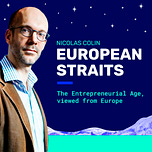The Agenda 👇
Hilary Cottam’s inspiring map for reinventing the welfare state 🎧
My latest column in Sifted: remote work as the new frontier on the labor market
What quant investor Jim Simons reveals about capitalism on financial markets
My take on GameStop, and how the little guys took on large hedge funds
Lessons shared by my friend Ben Robinson on business strategy
Why Geoffrey Moore’s Crossing the Chasm still matters for startup founders
🎧 The most recent Building Bridges podcast is out, featuring Hilary Cottam, author of Radical Help. I first wrote about Hilary’s book back in 2018 (in Le Monde, no less!), remarking that,
For Cottam, the solution isn’t to reform the current system but rather to invent a new one. She believes that the most important question is how to correct the original sin of the welfare state’s transactional nature, whereby it does not take into account the relationships between individuals themselves. The fact is that most people are surrounded by a group, whether large or small, of family and friends. But this group is in no way an actor within the social protection system. We are covered individually, but the system does not take into account the other individuals to whom we are connected.
Needless to say, I find her approach fascinating, and highly recommend giving a listen! Use the player above or go listen on Apple Podcasts or Spotify 🎧
⚠️ In my latest Sifted column, I talk about a big opportunity that governments—including that of the EU—could take advantage of: the acceleration of remote work and the need to adapt institutions to facilitate remote work for both employers and employees. Of course, even with institutional changes there will still be significant questions that remain, such as wage rates based on location. But if governments confront issues such as payroll taxes, social security, and labor law in a way that turns remote work from an HR headache into a banal fact of the 21st century economy, it could provide a real competitive advantage in terms of economic development.
👉 Read the whole column on the Sifted website: Remote work: HR nightmare?
🐳 Doing Capitalism in Financial Services (Round 1)
Given that it deals with, well, capital, you’d think that financial services would be a place where capitalism naturally has the upper hand on the market economy. Yet much of the industry really does exist in the simple logic of ‘buy low, sell a bit higher’. And that is about as simple a definition of the market economy that one can have.
For a long time, there weren’t many (if any) spaces where you could insert capital into the financial services production process in order to escape to the promised land of increasing returns to scale. Even today, it’s not that easy—just ask any startup founder who’s trying to find the right business model that can unlock that door, whether in financial services or elsewhere.
In this edition, I provide some early notes on a book I’ve been reading recently, Gregory Zuckerman’s The Man Who Solved the Market. It shows how traders back in the latter half of the 20th century started to have ideas about how financial services could move from the market economy into capitalism, but also how those often brilliant minds had to wait until digital technology caught up and made it all possible.
👉 I look at why the industry is still very much within that transition, highlighting the story of Jim Simons’s Renaissance Technologies, in Doing Capitalism in Financial Services (Round 1).
👑 Everyone Wants To Be a Capitalist
The one thing I’m quite sure of regarding the GameStop story is that we haven’t seen the end of it yet. One reason why is because it has been driven (even without falling into the facile idea of “little guys vs. hedge funds”, which has been pretty well shown to not be the case) by the ‘multitude’: those billions of networked individuals who can now exert power in the Entrepreneurial Age.
It shouldn’t be a surprise that many members of the multitude were drawn towards trading over the past year. After all, while much of the world’s market economy has been effectively halted by COVID-19, it’s been only too evident that the capitalist side of things has been doing quite well. That left a ripe environment for what my friend Martin Gurri calls “The Revolt of the Public” to make its way to the heart of Wall Street (which, as it turns out, is located less in Zuccotti Park and more in Bloomberg terminals 😉).
In the end, it’s not simply that barriers to information have been taken away. It’s that without those barriers, the multitude is able to coordinate in ways that were never before possible. It’s no guarantee that ‘the people’ will win against hedge funds; but at the very least, it’s a guarantee that there’s a new player in the game who must be accounted for.
👉 I give my contribution to the financial story of the week in Everyone Wants To Be a Capitalist.
♛ Ben Robinson on Business Strategy
With The Family’s current batch of startups, we hold regular private meetups with entrepreneurs, operators and investors who can provide key insights on various aspects of building an ambitious business. This past week, I invited my friend Ben Robinson of Aperture to join us to discuss one of my favorite topics: business strategy.
Specifically, we talked about how business strategy is no longer only for big corporations, but can also function as a guiding principle from the very earliest of stages. Having strategy ready to serve as a kind of guide can even be critical in the early days, since a startup is necessarily dealing with a high level of uncertainty on a daily basis.
The areas where strategy can come into play are many: from choosing your market to structuring operations, from building your brand to properly valuing engagement. Each area may require its own approach and have its own lessons to learn; but if you have a clear and coherent strategy in mind, it can serve as the unifying link between them all.
👉 I provide ten highlights from the talk in Ben Robinson on Business Strategy.
💼 A Few Notes on Crossing the Chasm
One feature of many business books is that you don’t really need to read the whole thing to understand the key point. That could sound like a critique, but the truth is that many of those key points really are important, and I’m often grateful that they’re out there circulating, even if the book itself might not lend itself to a second reading (or even a complete first reading).
Geoffrey Moore’s Crossing the Chasm is one of those books for me. The framework that Moore develops, clearly outlining various customer segments and what drives their purchasing behavior, is highly valuable for an entrepreneur. Knowing which niche you’re focusing on at the moment, and then later figuring out how to adapt your sales pitch for the next group you’re targeting, is critical. After all, if you’re not speaking to people in a way that understands their behavior, you aren’t going to get very far in selling to them.
And I think there’s something there that might be a universal trait of great entrepreneurs: they always seem to understand exactly what category their interlocutor belongs to, and thus they know how to sell their product. So while a young entrepreneur needs to learn thousands of things in hundreds of different domains, I’d still say developing that particular skill would be a good one to focus on!
👉 I cite some other thinkers as well in A Few Notes on “Crossing the Chasm”.
Sounds interesting? Subscribe to European Straits and let me know what you think!
From The Networked Welfare State (November 2018):
The digital transition allows Hilary Cottam to bring forward her vision with a great deal of optimism. Thanks to digital tools, the idea of inventing a networked welfare state isn’t just a utopia, but instead a promising possibility. The digital world connects individuals, circulating information between them and calling on them to contribute where needed to better cover and help the others. It doesn’t require one to renounce national solidarity, but rather to realize that individuals covered by the welfare state can form an active network rather than a passive queue in front of an office door.
All recent editions:
A Few Notes on Crossing the Chasm—for subscribers only.
Ben Robinson on Business Strategy—for subscribers only.
Everyone Wants To Be a Capitalist—for subscribers only.
Doing Capitalism in Financial Services (Round 1)—for subscribers only.
London & Paris Together. Business Strategy. Peak Bay Area. Lobbying Regulators.—for everyone.
A Founder’s Handbook for Lobbying the Government—for subscribers only.
Away From the Bay Area—for subscribers only.
Business Strategy at a Small Scale—for subscribers only.
The New Entente Cordiale—for subscribers only.
Gender Equality w/ Nina Goswami. India. Financial Loops. Rich People. War & Inflation.—for everyone.
European Straits is a 5-email-a-week product, and all essays are subscriber-only (with rare exceptions). Join us!
From Munich, Germany 🇩🇪
Nicolas




















Share this post